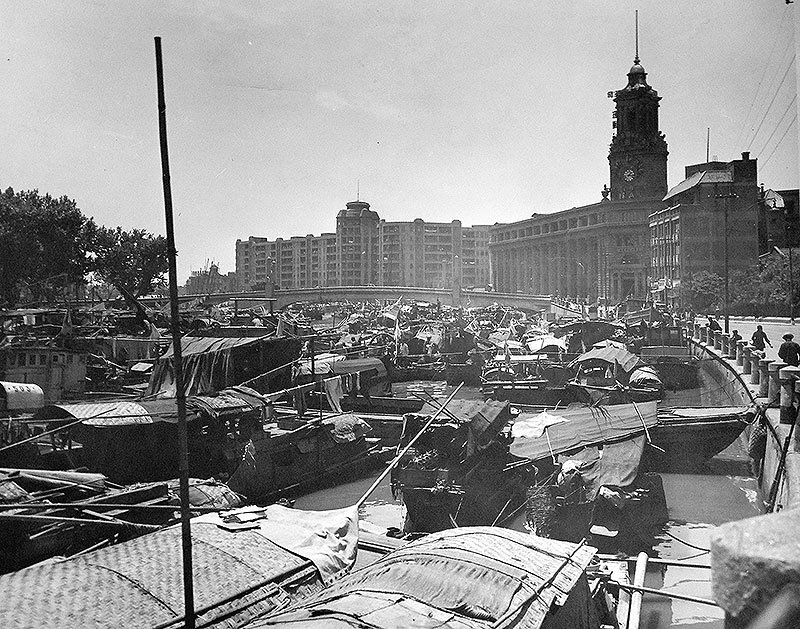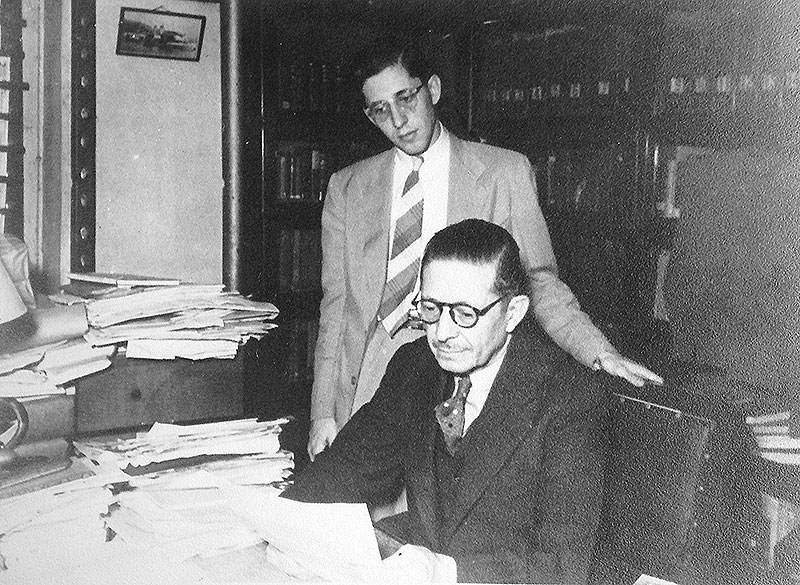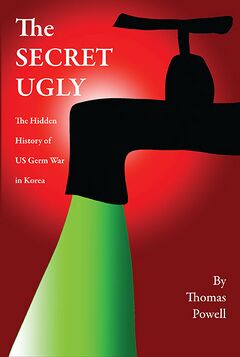War in Korea
Historical Essay
by Tom Powell
Soochow Creek (Suzhou Creek) c. 1948. The building on the right with the clock tower is the British-built General Post Office. In the center background is the Embankment Building where Bill and Sylvia lived when this photo was taken.
Photo: Powell Family Archives
In the United States, the Korean War is widely known as the “forgotten war.” This characterization is used by scholars and comic book authors alike, and we are all familiar with it. Until I began this study, I knew little about the Korean War. When I asked my friends about it, I quickly discovered that they too were ignorant, even though some had fathers and uncles who had served in the military. It seemed, in a strangely self-fulfilling manner, that most Americans know little of the Korean War other than it has been forgotten! That subtle message of the label had worked quite well by facilitating a national memory loss. But why should we want to forget war in general, and why the Korean War in particular?
With this question I began a journey of discovery in which I undertook, for admittedly personal motives, to rediscover the forgotten history of the Korean War. My parents, John William (Bill) Powell and Sylvia Campbell Powell, had both played significant historical roles as journalists and whistleblowers in the Korean War. Their federal sedition trial was a major event in the political purge of the Left under McCarthyism during and after the war. Sylvia and Bill Powell’s story represented a significant part of American Cold War history which was in danger of being erased. The forgotten Korean War is itself an epic saga of dramatic events filled with hot war, daring journalism, prison camp uprisings, torture, brainwashing, bacteriological warfare, infamy, war crimes, battlefield reversals, and mass genocide. It deserved to be remembered, and that became my task.
In my telling, the story of my parents collides with the history of the war as this bitter conflict barges into a courtroom drama pitting the whistleblowers of conscious standing against the arrayed might of the State with its Hobbesian-imposed right of legal coercion. This is a David vs. Goliath story which fortunately ended well for Bill and Sylvia Powell. However, to truly understand the significance of my parents’ role in this history, one must navigate a tapestry of tales and exposés of the ugly conduct of US Armed Forces overseas, including germ war deployment. Bill and Sylvia Powell witnessed this history from the front row and wrote about it honestly in their news magazine, the China Weekly Review (later the China Monthly Review) based in Shanghai. They landed in deep trouble for their efforts as journalists. In later years, Bill Powell was the first to reveal to the American public the “deal with the devil,” in which US authorities allowed Imperial Japanese medical scientists to go unpunished in exchange for the results of years of medical experimentation with diseases and germs on war prisoners. This is their remarkable story intertwined with the stories of many others of their generation who played major roles in the little-told saga we in the US call the Korean War.
The Korean War was a particularly brutal mid-20th century, US-prosecuted war on the distant shores of Asia which killed more than 4 million Koreans. It brought into battle the rival political and economic ideologies of capitalism and communism, and subsequently ignited four decades of East/West Cold War which included the terrifying possibility of nuclear annihilation of all planetary life. The Korean War was the first “hot war” of the Cold War and was therefore a pivotal event in world history. It was certainly not a peripheral event to be silently discarded down a collective memory hole.
The secret ugly of this war for Americans is that the US Armed Forces used manufactured disease agents, particularly smallpox and bubonic plague, as biological warfare (BW) weapons against the North Korean and Chinese armies and the civilian populations. This is where the Powells’ story sharply intersects with international Cold War history. In their newsmagazine, China Weekly Review, published in Shanghai where they lived, Bill and Sylvia Powell pointed an accusing finger at the United States to denounce it for spreading toxic agents across North Korea and China. Courageously or foolishly, out of moral outrage or patriotic duty, from fear of global pandemic, or anger at the perpetrators of such grand criminality, this is where my parents acted to insert their lives into the arc of world history. By revealing in their newsmagazine the US war conduct in Korea, and by refusing to back down, they became pariah and scapegoats for official US anger and punishment.
Forgetting ugly and inconvenient history is not a new process for Americans; in fact, we are quite practiced at it, as are our history custodians. How much do we really remember today of three centuries of North American chattel slavery, of Indian Wars, land grabs and genocide, of the exploits of Colonel Andrew Jackson against the Creek Nation or General Zachery Taylor in the invasion and theft of “el Norte” of Mexico, or General Arthur MacArthur and the Philippine Campaign? These events share in common the hidden atrocities of US imperialism. The success of the US imperial model over the course of the past two and a half centuries has been built upon a political and military violence which is so appalling that its full scope must be hidden from the American public.
Bill Powell had been a journalist and editor in China for twelve years by the time he made the above charge. During WWII he served in the US Office of War Information in Chungking (Chongqing) the temporary seat of the Nationalist Chinese government. In 1945 Powell reopened the Review offices in Shanghai which had been ransacked by the Japanese Army. His editorial policy followed the liberal views established by his father, J.B. Powell, who founded the magazine in 1917. Powell supported the formation in China of a national coalition government and a constitutional democracy. He supported the year-long mission of Special Envoy George Marshall to find a path for political reconciliation of the Nationalist Kuomintang Party (KMT) and the Chinese Communist Party (CCP). He argued for the formation of a centrist liberal democratic party which he hoped would emerge from the Democratic League, a body of Western-educated intellectuals and educators which was the Review’s readership within China. He supported the student movements which had sprung up in major cities across China demanding political and economic reforms.
Bill Powell with his father, J.B. Powell, at the China Weekly Review office in Shanghai, c. 1940.
Photo: Powell Family Archives
Of course there were later repercussions against my father and my mother, who was the Review’s managing editor, and their associate editor, Julian Schuman, for this J’accuse. All three were indicted in 1956 by a federal grand jury in San Francisco on charges of sedition. Bill Powell faced 12 counts of sedition with penalties of 20 years imprisonment and $10,000 fine on each count. Sylvia Powell and Julian Schuman faced one count each of conspiracy. The story of the Powell/Schuman show trial awaits in this narrative but let me say here that the three years of pre-trial events were a tremendous ordeal and cause of fear for all my extended family. As a small child it was terrifying to overhear that my father could go to prison even though I did not yet understand what that meant.
The trial ended dramatically on the third day when the judge misspoke and was forced to declare a mistrial. The case lingered in court for three years and was finally dropped in 1961 by the new Attorney General, Robert Kennedy. Still, it was a highly effective legal means to stifle the BW story after the war through the heavy hand of the courts. American businessmen, missionaries, journalists, or any other civilian who might have had damning personal knowledge of US war atrocities in Korea were not willing to come forward to tell that story publicly after witnessing the Powell’s ordeal. This heavy hand was extended to all veterans as well, most especially returning POWs. Those POWs who had confessed to war crimes in Korea were interrogated by Army psychologists. They were persuaded to sign recantations or face court martial. The FBI maintained surveillance of Korean War veterans for more than two decades after the war.(1) Surveillance and legal coercion effectively clamped down on germ war talk and the topic disappeared from public discussion. It wasn’t until two decades later that Bill Powell revisited the Korean War BW charges.
Notes
1. The Korean biological war (BW) campaign was an experiment to see what actually worked in combat. After a decade of intense US scientific research at Ft. Detrick, and with the acquisition of the Japanese program along with its principle architects, the Pentagon was anxious to see how well BW worked in combat. As Theodor Rosebury said and Dorothy Miller repeated, until BW was tested on humans in battle, its effectiveness as a weapons system could not be known.
This account is excerpted from The Secret Ugly: The Hidden History of US Germ War in Korea by Thomas Powell, Edgewater Editions: 2023.



